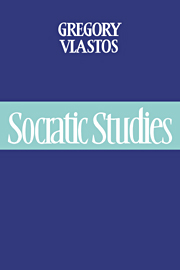Book contents
- Frontmatter
- Contents
- Editor's preface
- Abbreviations
- 1 The Socratic elenchus: method is all
- 2 Socrates' disavowal of knowledge
- 3 Is the “Socratic fallacy” Socratic?
- 4 The historical Socrates and Athenian democracy
- 5 The Protagoras and the Laches
- Epilogue: Socrates and Vietnam
- Additional notes
- Bibliography
- Index of passages cited
- Index of ancient names
- Index of modern scholars
- Index of Greek words
5 - The Protagoras and the Laches
Published online by Cambridge University Press: 29 October 2009
- Frontmatter
- Contents
- Editor's preface
- Abbreviations
- 1 The Socratic elenchus: method is all
- 2 Socrates' disavowal of knowledge
- 3 Is the “Socratic fallacy” Socratic?
- 4 The historical Socrates and Athenian democracy
- 5 The Protagoras and the Laches
- Epilogue: Socrates and Vietnam
- Additional notes
- Bibliography
- Index of passages cited
- Index of ancient names
- Index of modern scholars
- Index of Greek words
Summary
MORAL VS. TECHNICAL KNOWLEDGE
There is a passage in the Laches which poses a problem for the interpreter of Socrates' moral theory. Though often discussed in the scholarly literature, there has been as yet no definitive solution to its puzzle. It occurs in Socrates' argument with Laches 192D–193C.
The answer Laches had just proposed – “endurance” – (192B–C) to “What is courage?” had been rejected because it failed to stipulate that, to qualify as courageous, endurance had to be guided by wisdom. Drop that stipulation and the answer is easily discredited:
TI La. 192C–D: “Is not wise endurance noble and good?” “Absolutely.” “And what of foolish endurance? Is not that, on the contrary, harmful and evil?” “Yes.” “And would you say that that sort of thing, evil and harmful, is noble?” “That would not be right, Socrates.” “So you would not consider it courage, for it is not the noble thing which courage is?” “True.” “So according to this argument courage would be wise endurance?”
When Laches agrees – he could hardly do otherwise – it looks as though Socrates would concede that courage is wise endurance. But he does not. What he now wants to know is what sort of wisdom this would have to be: “Wise in what (είς τí φρóνoς)? In all things, be they great or small?”
- Type
- Chapter
- Information
- Socratic Studies , pp. 109 - 126Publisher: Cambridge University PressPrint publication year: 1993



